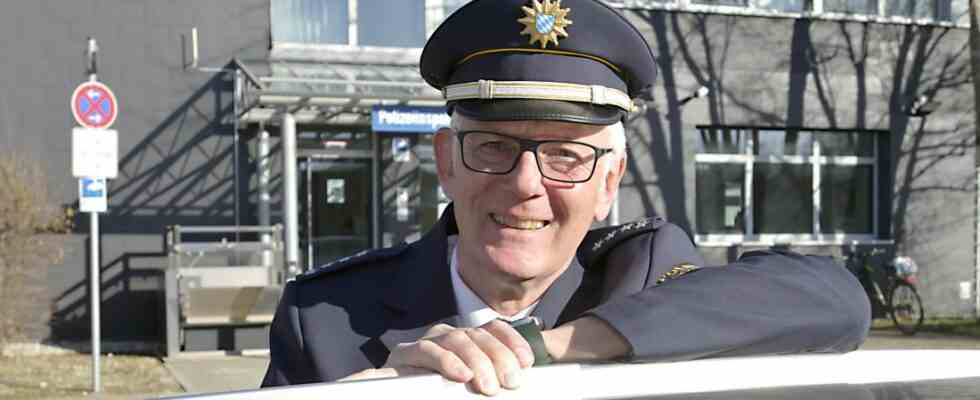Armin Ganserer will leave one island in order to land on another in the summer. For a total of 13 years, the 64-year-old was head of Police Inspectorate 28 in Ottobrunn, which is responsible for the communities of Aying, Brunnthal, Hohenbrunn, Höhenkirchen-Siegertsbrunn, Neubiberg, Ottobrunn, Putzbrunn and parts of Taufkirchen and Unterhaching. The area of operation is the largest of all inspections by the Munich police headquarters and, according to Ganserer, an “island of bliss” because there are only “little problems” compared to the state capital. This Tuesday, the head of the PI is leaving the office and is already longing for summer, when he and his wife are planning a trip to Iceland. “Finally,” he says, seeming a little relieved.
Ganserer has almost completely cleared out his office in the unadorned building on Haidgraben in Ottobrunn, with only a few pictures still hanging on the wall. The folder with the intern folder is still on the desk. Again and again, pupils from the Ottobrunn grammar school in particular get a taste of a job that the outgoing PI boss found rather by accident – and which he, he frankly admits, would no longer choose today. It’s a sentence that Ganserer utters calmly in his office with a view of the surrounding commercial buildings, although the words of someone who has been in the service for more than four decades are surprising: “No, I wouldn’t go to the police again, That wouldn’t be my first wish. I’d rather study.”
A friend told him at the time that he should simply go along to the police employment test, Ganserer recalls. “I was 18 at the time and at a young age I didn’t know what to do.” Two things drew him to the job of police officer back then: his strong sense of justice and a soft spot for the legal profession. “And the wide range that this job entails.” He does his training in Königsbrunn and takes his exams in Dachau; but then he resigns and begins an apprenticeship at the Sparkasse. “Because I had doubts at the beginning as to whether this was the right path.”
But after the police promised him he returned and went on patrol in Germering, where he grew up. “Classic shift work,” as he says. This was followed by positions at the police department in Fürstenfeldbruck, at the police headquarters in Upper Bavaria, which still existed at the time, at the department for organized crime and ten years of staff work at the police headquarters and in the Bavarian Ministry of the Interior.
“After ten years of staff work, it was clear that I wanted a management position,” Ganserer recalls. By this time he had already established connections in the district of Munich. He meets his wife, who lives in Unterhaching, moves in with her, applies for the position of PI boss in Ottobrunn in 2010 – and is accepted.
Ganserer has always been a very present police chief. One who is close to the people, present at every town hall meeting in the communities in his own distribution area, where he cheerfully and wittily presents the latest statistics on crime, operations and clear-up rates. And there is always something to report: the 40 or so police officers travel from Ottobrunn to more than 7,000 operations each year. “And there are at least ten police measures per operation. It starts with the normal hello and a request for a driver’s license,” says the outgoing PI boss. “And when I see that we only have an average of five to ten complaints in 7,000 operations, then I just take my hat off to my colleagues.”
“Previously, there were no fundamental doubts about what the policeman says and does”
According to Ganserer, the job of a police officer has become more and more demanding over time. “Significantly broader in terms of requirements. More difficult in terms of jurisdiction,” he says. “And yet every citizen rightly expects that the colleague out there does his job properly and that it also stands up legally.” And that in a society in which people’s demands have increased and respect for institutions such as the police has suffered. “Previously, there were no fundamental doubts about what the policeman says and does.”
Nevertheless, he still expressly advises young people to take up this profession, precisely because of the great diversity that he has experienced himself. The time as head of inspection in Ottobrunn, the island of the blessed, will remain in his memory particularly well. “The special appeal here is the interplay of urban and rural areas,” says Ganserer. “And what could be nicer than being on duty at the Bräukirta, where the policeman is still spoken to on a first-name basis?”
However, his doubts about being a police officer never left him. “It was never my police force, especially not at the beginning,” he says without going into detail. “But I was always happy to be part of this police force.”

